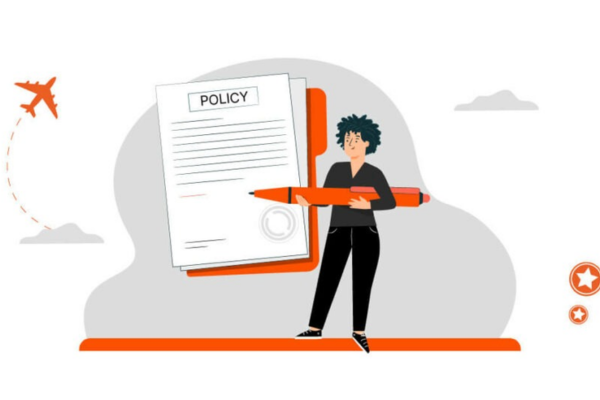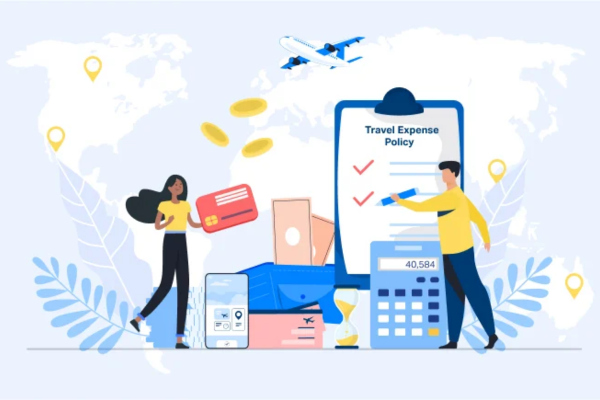Essential Travel Policies Every Small Business Should Have
03 February 2025
5 Mins Read

toc impalement
Business travel is necessary. If you are a part of any business, you may always be on the go to meet clients overseas or manage operations in different locations.
However, if you do not have proper policies, your small business will run into different financial inconsistencies, including employee safety risks or one to two compliance issues.
Well-structured travel policies for small business can ensure better cost control and accountability. Moreover, it helps with better consistency to safeguard the company and its employees.
Below are the essential policies every small business should implement to streamline travel management and reduce potential risks.
1. Expense Reimbursement Policy
Business trips comprise various expenses. Hotels, flights, meals, transportation….a lot of things are added to the trips. So, if you have a well-defined travel policies for small businesses, you must ensure your employees understand:
- What kind of expenses are covered?
- What kind of documentation is required?
- How to submit the claims?
Clearly outline:
- Eligible expenses – This includes transportation, lodging, meals, and incidentals.
- Spending limits – Set daily or per-category limits to prevent excessive spending.
- Reimbursement process – Specify deadlines, required receipts, and approval hierarchy.
- Non-reimbursable costs – Define items that are not covered, such as minibar purchases, in-room entertainment, or personal expenses.
Providing employees with a structured reimbursement framework prevents disputes and ensures compliance with company budgets.
2. Booking and Approval Process

A standardized booking policy helps control costs and maintain consistency. Businesses should clarify:
- Who books travel – Employees may handle their arrangements, or a designated person might manage all reservations.
- Preferred booking channels – Specify if employees must use particular travel agencies, booking platforms, or corporate accounts. Moreover, a corporate travel management company can streamline this process by offering negotiated discounts and automated expense tracking.
- Advance booking requirements – Encouraging reservations weeks in advance can significantly reduce costs.
- Approval requirements – Determine if all travel needs prior approval or if only trips exceeding a certain budget require authorization.
A structured process prevents last-minute spending spikes and ensures trips align with business needs.
3. Per Diem and Meal Allowance Policy
Instead of reimbursing individual meal receipts, many businesses set a daily per diem for food and incidentals. This approach simplifies expense tracking and prevents excessive claims.
Establish:
- Per diem rates – Align with federal or industry standards to maintain fairness.
- Geographic adjustments – Higher allowances may apply in expensive cities.
- Meal coverage – Determine if employees can expense alcohol or entertainment costs when dining with clients.
Standardizing meal reimbursements minimizes confusion and streamlines administrative processing.
4. Accommodation and Transportation Guidelines
Companies must define acceptable lodging and transportation options to prevent overspending while ensuring employee comfort and safety.
For lodging, clarify:
- Hotel class limits – Specify star ratings or nightly rate caps.
- Alternative accommodations – Indicate if Airbnb or extended-stay rentals are permitted.
- Location preferences – Encourage proximity to meeting locations to minimize transit time.
For transportation, address:
- Flight class – Define if employees must fly economy, premium economy, or business class.
- Car rentals vs. rideshares – Specify when car renting is justified over using Uber or taxis.
- Public transit usage – Encourage budget-friendly transport methods where applicable.
Balancing cost and employee convenience ensures responsible spending while maintaining efficiency.
5. Duty of Care and Safety Policy
Companies have a responsibility to safeguard employees while traveling. A comprehensive duty of care policy should address:
- Emergency procedures – Provide clear instructions for medical emergencies, lost passports, or travel disruptions.
- Travel risk assessment – Evaluate security risks for international travel and issue appropriate precautions.
- 24/7 support contacts – Offer access to emergency helplines or travel assistance services.
- Travel insurance coverage – Specify if medical or trip-cancellation insurance is provided.
Ensuring employee safety reduces liability while fostering confidence in work-related travel.
6. Use of Corporate Credit Cards

Many businesses issue corporate credit cards for easier expense tracking. A corporate card policy should outline:
- Eligibility – Specify which employees qualify for a company card.
- Permissible expenses – Define categories that can be charged (e.g., flights, hotels, and meals).
- Transaction limits – Set daily or per-transaction caps to prevent misuse.
- Repayment responsibility – Clarify whether employees must cover personal charges.
A clear corporate card policy minimizes administrative burden while reducing financial inconsistencies.
7. Travel Policies For Small Business: Bleisure Travel and Personal Expenses Policy
Combining business and leisure (bleisure) travel is becoming common, but businesses must define when and how personal expenses are handled. Establish:
- Eligibility – Clarify if employees can extend business trips for personal travel.
- Cost segregation – Separate payments are required for non-business expenses.
- Liability waivers – Define who bears responsibility for non-work-related incidents during extended stays.
This ensures business resources are not misused while allowing employees flexibility when appropriate.
8. Data Security and Confidentiality Guidelines
Business travel exposes employees to heightened cybersecurity threats, making a well-defined data protection policy essential.
Traveling with company devices, accessing public networks, and handling sensitive information all introduce risks that must be addressed.
Secure Internet Use
Employees should avoid public Wi-Fi connections unless using a company-approved VPN. Public networks in airports, hotels, and coffee shops are highly vulnerable to cyberattacks.
Employees should use personal mobile data or tethered connections instead of open networks.
Device Security
Company devices such as laptops, tablets, and smartphones must have the latest security updates and firewall protections.
Additionally, multi-factor authentication should be mandatory for accessing corporate systems. Strong passwords and automatic locking mechanisms should also be enforced.
Confidentiality Protocols
Employees must avoid discussing sensitive business matters in public spaces. Conversations in taxis, restaurants, or conference lobbies can be overheard, posing a risk to company security.
Moreover, employees should also avoid viewing confidential documents in public areas where screens can be easily seen.
Phishing and Cyber Threats
Travelers are prime targets for cybercriminals. Employees should be trained to recognize phishing scams, emails requesting login credentials, or urgent financial transactions.
Suspicious emails, especially from unknown sources, should never be opened or responded to while traveling.
Lost or Stolen Devices
The employees must report to IT immediately if things get stolen or lost. Moreover, businesses should have remote locking and data-wiping capabilities. Furthermore, this can help to prevent unauthorized access.
Travelers must keep their important devices secure all the time and avoid leaving them behind, totally unattended.
Building a Smart Travel Policy
A well-crafted travel policy can help your small business take control of overall costs, beter employee safety, and further efficiency. This way, you can create a seamless travel experience while minimizing the financial and operational risks.
As a part of your small business, all you have to do is implement guidelines based on expense management, booking accommodations, and security.
Always remember that structured travel policies for small businesses can benefit employers and employees. Moreover, the approach helps to ensure that all of your business trips are very productive and cost-effective and further comply with company policies.
Travel Policies For Small Business: Too Crucial To Ignore!
In conclusion, as a growing business, you must invest in the right tools, processes, and systems. This way, you can easily promote meaningful travel programs while managing expenses.
Apart from that, I suggest you get a business travel manager. They can not only help you with internal policies or expenses but also provide an easy-to-use platform for better support.


















Comments Are Closed For This Article